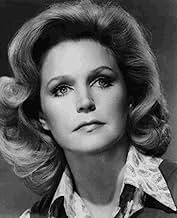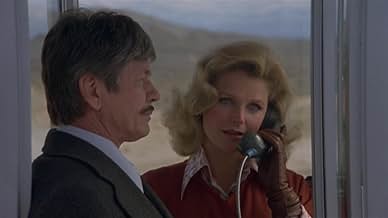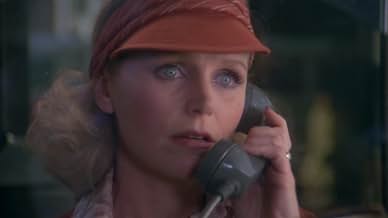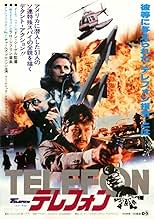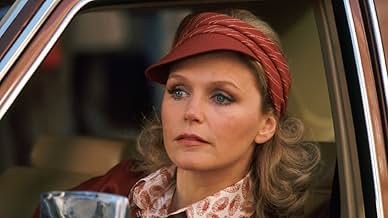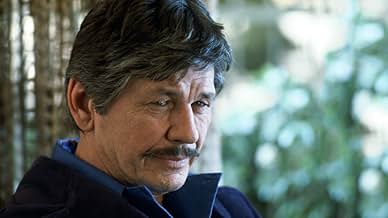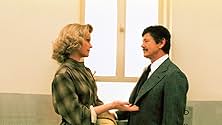IMDb RATING
6.5/10
6.6K
YOUR RATING
A Russian officer is sent to the U.S. to try and stop sleeper agents who will mindlessly attack government entities when they hear certain coded words.A Russian officer is sent to the U.S. to try and stop sleeper agents who will mindlessly attack government entities when they hear certain coded words.A Russian officer is sent to the U.S. to try and stop sleeper agents who will mindlessly attack government entities when they hear certain coded words.
- Awards
- 1 nomination total
Regis Cordic
- Doctor
- (as Regis J. Cordic)
Featured reviews
I was never a big Charles Bronson fan. His movies usually followed the same predictable patterns of revenge and violence with Bronson usually coming off dry and stiff. His performances were usually always one note.
Of the few films of his I have enjoyed (see also "The Mechanic" and "Hard Times") from that era, "Telefon is a surprisingly gripping thriller even though the story is downright silly at times. Bronson plays (and doesn't even begin to resemble) a KGB agent out to track a killer who have been brainwashed. One call from this guy and the reciting of some lines from a Frost poem and that person is hypnotized into going out and committing an act of violence that resembles terrorism in many cases. Donald Pleasance convincingly plays the bad guy and that, I think, is what makes the movie work. Pleasance is credible in the role, thus we fear him and route for Bronson to catch him. Also on hand is Lee Remick as an American agent assigned to help Bronson but who also has a hidden agenda of her own.
Director Don Seigel handles the silly material in a straightforward manner never taking things too seriously. Bronson is less stiff then usual and the action scenes are well done. The ending is a bit abrupt but that is minor nit picking. It's a silly thriller I enjoyed and, if you are a Bronson fan, I am sure you will enjoy it too.
Of the few films of his I have enjoyed (see also "The Mechanic" and "Hard Times") from that era, "Telefon is a surprisingly gripping thriller even though the story is downright silly at times. Bronson plays (and doesn't even begin to resemble) a KGB agent out to track a killer who have been brainwashed. One call from this guy and the reciting of some lines from a Frost poem and that person is hypnotized into going out and committing an act of violence that resembles terrorism in many cases. Donald Pleasance convincingly plays the bad guy and that, I think, is what makes the movie work. Pleasance is credible in the role, thus we fear him and route for Bronson to catch him. Also on hand is Lee Remick as an American agent assigned to help Bronson but who also has a hidden agenda of her own.
Director Don Seigel handles the silly material in a straightforward manner never taking things too seriously. Bronson is less stiff then usual and the action scenes are well done. The ending is a bit abrupt but that is minor nit picking. It's a silly thriller I enjoyed and, if you are a Bronson fan, I am sure you will enjoy it too.
Telefon casts Charles Bronson as a KGB agent on assignment in America trying to stop Donald Pleasance from igniting World War III. Bronson is aided and abetted uneasily by CIA agent Lee Remick and the two of them get involved with each other as well as the mission at hand.
It's quite a mission they have, Pleasance is an old line Stalinist and he's noticed the new regime is slowly doing away with his kind. So he knows about this operation involving 51 Manchurian candidates who are Russian sleeper agents the way Laurence Harvey was in the Manchurian Candidate. With the proper phrase these people who are under hypnosis and just living regular humdrum lives get a signal to complete a mission involving sabotage of some military installation in their area. Pleasance has come to America to set these agents off.
It might have been a whole lot easier to just dial long distance once he was out of the Soviet Union, but apparently Pleasance is also getting a few jollies and really wants to see his handiwork. Bronson gets the list and follows Pleasance's trail hoping to head him off.
A nice cast of talented players pulls off and makes entertaining when you think about it, a really silly Cold War era story. Pleasance as usual pulls all the stops out as the villain and Bronson is his usual menacing self. His loyal legion of fans might like Telefon, I'm kind of partial to it myself, but I recognize it's illogicality.
It's quite a mission they have, Pleasance is an old line Stalinist and he's noticed the new regime is slowly doing away with his kind. So he knows about this operation involving 51 Manchurian candidates who are Russian sleeper agents the way Laurence Harvey was in the Manchurian Candidate. With the proper phrase these people who are under hypnosis and just living regular humdrum lives get a signal to complete a mission involving sabotage of some military installation in their area. Pleasance has come to America to set these agents off.
It might have been a whole lot easier to just dial long distance once he was out of the Soviet Union, but apparently Pleasance is also getting a few jollies and really wants to see his handiwork. Bronson gets the list and follows Pleasance's trail hoping to head him off.
A nice cast of talented players pulls off and makes entertaining when you think about it, a really silly Cold War era story. Pleasance as usual pulls all the stops out as the villain and Bronson is his usual menacing self. His loyal legion of fans might like Telefon, I'm kind of partial to it myself, but I recognize it's illogicality.
I've always liked this movie. But watching it now it is difficult not to laugh out loud at the ridiculous scenes featuring Tyne Daley and her "supercomputer." This stuff was out of date when the film came out, relying on "Lost in Space" style simplicity.
But that's forgivable. What really kept the flick from really being a classic, however, is that it is totally missing the third act! The film ends abruptly with the villain, Dalchimsky, done away with in a fairly simple manner in the small town bar. In the novel, Dalchimsky is also killed in the bar, but not before passing along the coded message that set off the last "sleeper" who then proceeds to make his way to blow up Hoover Dam (or some big damcan't remember off the top of my head). Then Bronson and Remick's characters had to race to stop the impending disaster. It was a big, exciting ending and I can't understand why they left it out. Maybe they just didn't have the budget. I think spending the dough it would have taken to include the book's ending would have helped mitigate the low budget "TV Movie" feeling "Telefon" often suffers from. But producers knew that Bronson's name would consistently pull a certain audience no matter what, so they rarely tried to do anything big in his films and he never insisted on ita fact that eventually led to the decline of his career.
But that's forgivable. What really kept the flick from really being a classic, however, is that it is totally missing the third act! The film ends abruptly with the villain, Dalchimsky, done away with in a fairly simple manner in the small town bar. In the novel, Dalchimsky is also killed in the bar, but not before passing along the coded message that set off the last "sleeper" who then proceeds to make his way to blow up Hoover Dam (or some big damcan't remember off the top of my head). Then Bronson and Remick's characters had to race to stop the impending disaster. It was a big, exciting ending and I can't understand why they left it out. Maybe they just didn't have the budget. I think spending the dough it would have taken to include the book's ending would have helped mitigate the low budget "TV Movie" feeling "Telefon" often suffers from. But producers knew that Bronson's name would consistently pull a certain audience no matter what, so they rarely tried to do anything big in his films and he never insisted on ita fact that eventually led to the decline of his career.
This excellent spy thriller directed by action master Don Siegel unfortunately has a drab, aloof title that causes many to skip it for a more exciting-sounding tag. Even Charles Bronson fans, and they are legion, often ignore this little gem for others of the genre. Not only a dilly of a suspense story filled with some of Hollywood's best actors at the time, "Telefon" also contains humor and many tongue-in-cheek lines. The Robert Frost poem, "Stopping by Woods on a Snowy Evening," utilized to trigger the drug-induced hypnotized Soviet agents to finish their mission becomes a pun for KGB agent Maj. Grigori Borzov (Bronson)when ready to give alluring Barbara (Lee Remick) a tumble in the hay. Borzov looks KGB agent Barbara lustfully in the eyes and emphatically affirms, "Miles to go before we sleep."
Though many consider the story fanciful, it is not as far fetched as some of the actual schemes concocted by overly zealous CIA and KGB officials during the Cold War, especially at the time of the eyeball to eyeball confrontation between the Soviets and the Americans during the days of U-2, the Bay of Pigs, and the Cuban Missile Crisis. The fifty KGB agents trained at the time of the U-2 Incident to replace recently deceased Americans with similar profiles, to take out key installation sites when receiving the oral code, lines from the Robert Frost poem, are put on what seems to be permanent hold until one KGB trainer goes berserk and reopens the can of worms over a decade later, when many of the installations have been closed, converted, or moved. Enter agents Borzov and his supposed helper, Barbara, to stop the madman, Nicolai Dalchimsky, played with his usual nefariousness by Donald Pleasence. Borzov uncovers a method to his madness and the fun begins. But what is to become of Borzov once Dalchimsky is removed? There's plenty of spills and thrills along the way with the seasoned actors given intelligent and often humorous lines by writer Peter Hyams whose script is based on the novel by Walter Wager.
Though no one in the cast falters, even in the bit parts, Tyne Daly steals the show as Dorothy Putterman (oh, how the name fits), a computer nerd in those glorious DOS days of old before the world heard of Bill Gates. Not only does Daly get some of the best lines in the movie, she delivers them with élan. She also reminds the viewer to be careful what is said to a computer, because they are very sensitive little fellers.
Though many consider the story fanciful, it is not as far fetched as some of the actual schemes concocted by overly zealous CIA and KGB officials during the Cold War, especially at the time of the eyeball to eyeball confrontation between the Soviets and the Americans during the days of U-2, the Bay of Pigs, and the Cuban Missile Crisis. The fifty KGB agents trained at the time of the U-2 Incident to replace recently deceased Americans with similar profiles, to take out key installation sites when receiving the oral code, lines from the Robert Frost poem, are put on what seems to be permanent hold until one KGB trainer goes berserk and reopens the can of worms over a decade later, when many of the installations have been closed, converted, or moved. Enter agents Borzov and his supposed helper, Barbara, to stop the madman, Nicolai Dalchimsky, played with his usual nefariousness by Donald Pleasence. Borzov uncovers a method to his madness and the fun begins. But what is to become of Borzov once Dalchimsky is removed? There's plenty of spills and thrills along the way with the seasoned actors given intelligent and often humorous lines by writer Peter Hyams whose script is based on the novel by Walter Wager.
Though no one in the cast falters, even in the bit parts, Tyne Daly steals the show as Dorothy Putterman (oh, how the name fits), a computer nerd in those glorious DOS days of old before the world heard of Bill Gates. Not only does Daly get some of the best lines in the movie, she delivers them with élan. She also reminds the viewer to be careful what is said to a computer, because they are very sensitive little fellers.
One effect of watching this one is that you will always read Frost's "Stopping By Woods" from a very different point of view.
No question, there's a whole lot of good acting in Don Siegel's "Telefon" (from Tyne Daly, for instance), but the story, from Walter Wager's novel, is, at least partly, ridiculous. Criticism of international secret policy comes off o.k., claiming that what intelligence agencies have always lacked most is intelligence. But it's more about suspense and action; especially the blowing up of a whole valley is staged with Siegel's dynamic perfection routine.
The film has got Charles Bronson in its center and he does his usual fine job as an ultra-cool Soviet major smuggled into the U.S. in order to exterminate a fellow KGB agent (Donald Pleasence) who has gone crazy there and is now endangering the whole Cold War balance system.
Please note the important rôle telephones play throughout the whole film, not just for Pleasence's ambitions. And watch out for Roy Jenson as his last victim, a man who has played lots of minor parts in major movies. - And don't forget listen to the film, as Lalo Schifrin's score is very fascinating once again.
No question, there's a whole lot of good acting in Don Siegel's "Telefon" (from Tyne Daly, for instance), but the story, from Walter Wager's novel, is, at least partly, ridiculous. Criticism of international secret policy comes off o.k., claiming that what intelligence agencies have always lacked most is intelligence. But it's more about suspense and action; especially the blowing up of a whole valley is staged with Siegel's dynamic perfection routine.
The film has got Charles Bronson in its center and he does his usual fine job as an ultra-cool Soviet major smuggled into the U.S. in order to exterminate a fellow KGB agent (Donald Pleasence) who has gone crazy there and is now endangering the whole Cold War balance system.
Please note the important rôle telephones play throughout the whole film, not just for Pleasence's ambitions. And watch out for Roy Jenson as his last victim, a man who has played lots of minor parts in major movies. - And don't forget listen to the film, as Lalo Schifrin's score is very fascinating once again.
Did you know
- TriviaDirector Don Siegel asked Charles Bronson to shave his trademark mustache off for this movie. Bronson replied, "No mustache, no Bronson." Siegel said in his book 'A Siegel Film: An Autobiography', "I felt that as much as Bronson wore a heavy mustache in Russia, it would help his disguise if he had no mustache when he arrives in Canada. However he didn't want to shave it off."
- GoofsAll of the KGB characters shown in uniform at the beginning of the film are "out of uniform." Although Borzov, Bronson's character, and the others are clearly meant to be in the KGB, the uniforms they wear are trimmed in red, the color of the regular Soviet Army, not the KGB. During the era of the film KGB uniforms were trimmed in Royal Blue. Also, the uniforms in the film lack the distinctive "Sword and Shield" patch worn by KGB officers on their jacket and coat sleeves.
- Quotes
Nicolai Dalchimsky: The woods are lovely, dark, and deep, but I have promises to keep. And miles to go before I sleep, and miles to go before I sleep. Remember. Miles to go before I sleep.
- ConnectionsFeatured in 42nd Street Forever, Volume 3: Exploitation Explosion (2008)
- SoundtracksThe Yellow Rose of Texas
(uncredited)
Traditional American folk melody
- How long is Telefon?Powered by Alexa
Details
- Release date
- Country of origin
- Language
- Also known as
- Telefon
- Filming locations
- Helsinki, Finland(Moscow, Leningrad, Russia, ten days)
- Production company
- See more company credits at IMDbPro
Box office
- Budget
- $7,000,000 (estimated)
- Runtime
- 1h 42m(102 min)
- Sound mix
- Aspect ratio
- 1.85 : 1
Contribute to this page
Suggest an edit or add missing content


